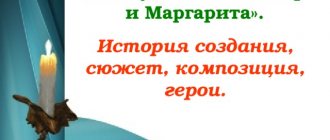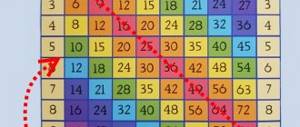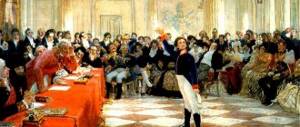Lesson summary on Russian literature on the topic “A.S. Pushkin “The Station Warden”” (7th grade)
Station 1.Read the statements about Duna.
1
"Little Coquette"
"like the girl who saw the light"
“Her beauty struck me.”
“Ah, Dunya, Dunya! What kind of girl was she!”;
“There are a lot of them, young fools, today in satin and velvet, and tomorrow they sweep the street with tavern nakedness”;
“The house was held together by her.”
“Wonderful lady... Such a kind lady!”
Identify the author:
— Samson Vyrin,
- neighbor boy Vanka,
the narrator who told Belkin this story,
- titular adviser A.G.N.,
— publisher A.P.
| Answers A.G.N.: “Little coquette”, “like a girl who has seen the light”, “Her beauty struck me.” Samson Vyrin about his daughter: “Ah, Dunya, Dunya! What kind of girl was she!”; “There are a lot of them, young fools, today in satin and velvet, and tomorrow they sweep the street with tavern nakedness”; “The house was held together by her.” Vanka: |
Conclusion:
How did the author show the process of Dunya’s transformation from a 14-year-old girl into a beautiful lady?
Station 2
.
One part of the group does the first part
Working with illustrations.
- Join groups. Look at the illustrations.
— arrange illustrations according to the plot;
— what illustrations show the exposition of the plot, the beginning, climax and resolution of this plot?
— select a fragment of the work that matches the illustration.
- discuss what words and phrases helped determine that this is exactly this passage;
- find artistic means of expression in the passage and explain why the author uses them.
Grading:
The teacher observes the activities of students who, having chosen an episode in a work, analyze the means of artistic expression that help create the desired effect: metaphor, grotesque, hyperbole, etc.
.
Students work in pairs and present their episodes to another pair for comments.
The teacher listens to student presentations in pairs, comments and evaluates.
Station 3.
Vienna diagram.
Exercise:
- Find and write down the similarities and differences between the parable of the Prodigal Son and the story of Dunya.
— are the main ethical categories preserved: repentance, forgiveness, mercy?
father from the parable of the prodigal son in the story of Dunya?
Station 4
.
— Repetition of definitions of the “parable” genre.
- Read it. What is the meaning of this parable?
| Christ's parable about the lost sheep. (Excerpt) … Which of you, having a hundred sheep and losing one of them, will he not leave the ninety-nine in the wilderness and go after the missing one until he finds her? And having found it, he will take it on his shoulders with joy and, having come home, will call his friends and neighbors and say to them: rejoice with me: I have found my lost sheep. ..so in heaven there will be more joy over one sinner who repents than over ninety-nine righteous people who do not need to repent. |
— What does the parable have to do with the story “The Station Agent”?
— To which episode of the story can the parable of the lost sheep be applied in allegorical form?
— How does the narrator see Vyrin’s father?
| “ Daughter, sir,” he answered with an air of satisfied pride , “she’s so intelligent, so nimble, like a dead mother.” Didn’t I really love my Dunya, didn’t I cherish my child? |
— What is contained in the expression “with an air of satisfied pride”?
- how does it explain his decision to bring home the “lost sheep”?
- What is this plot element called?
— what are the features of parables and stories as a genre.
– how would you formulate the theme and idea of the story? Use the idiom “lost sheep.”
Students must name the key features of the corresponding genre. Students take notes and each student presents their own thoughts to their classmate. They tell each other whether they agree or not and give reasons.
The teacher listens to the students and evaluates.
Presentation by A.S. Pushkin “Station Warden” presentation for a literature lesson (grade 7) on the topic
Slide 1
A.S. Pushkin “Station Warden”
Slide 2
Boldino. Autumn 1830 “Belkin’s Stories” “The Undertaker” - September 9 “The Station Agent” - September 14 “The Peasant Young Lady” - September 20 “The Shot” - October 14 “Blizzard” - October 20
Slide 3
Stationmaster's house
Slide 11
The image of Samson Vyrin 1. How did we first see the stationmaster? “I see, as now, the owner himself, a man of about fifty, fresh and cheerful, and his long green frock coat with three medals on faded ribbons 2. Find another portrait of this hero in the story. What has changed in this person? “It was definitely Samson Vyrin; but how he has aged. While he was getting ready to rewrite my travel document, I looked at his gray hair, at the deep wrinkles of his long-unshaven face, at his hunched back - and could not marvel at how three or four years could turn a vigorous man into a frail old man.”
Slide 12
3.What caused these changes? Antithesis - opposition of images, pictures, words, concepts 4. What did Samson Vyrin blame himself for? 5. What did the caretaker do to get his daughter back? 6. What qualities did you like in Vyrin’s character? How does this person make you feel? 7. Can Vyrin be called a “little man”?
Slide 13
A “little” person in literature is not only a person of low rank, without a high social status, but also a person lost in life, experiencing fear of it, having lost interest and the meaning of his existence.
Slide 14
Portrait of Dunya
Slide 15
What role did Dunya play in Vyrin’s life? Does Dunya leave her parents' home with ease or pain? 3. How is life between Dunya and Minsky? 4. Can this happiness be called cloudless? 5. What very important biblical commandment did Dunya break? 6. What does her fate make you think about? 7. Do you blame Dunya or defend? Prepare answers to the questions:
Slide 16
Parable of the Prodigal Son “A certain man had two sons; and the youngest of them said to his father: “Father! Give me the next part of the estate." And the father divided the estate for them. After a few days, the youngest son, having collected everything, went to a distant place and there squandered his property, living dissolutely. When he had lived through everything, a great famine arose in that country, and he began to be in need; and he went and accosted one of the inhabitants of that country, and he sent him to his fields to graze pigs; and he was glad to fill his belly with the horns that the pigs ate, but no one gave it to him.
Slide 17
Having come to his senses, he said: “How many of my father’s hired servants have an abundance of bread, but I am dying of hunger. I will get up, go to my father and say to him: “Father! I have sinned against heaven and before you and am no longer worthy to be called your son; accept me as one of your hired servants." He got up and went to his father. And while he was still far away, his father saw him and took pity; and, running, fell on his neck and kissed him. The son said to him: “Father! I have sinned against heaven and before you and am no longer worthy to be called a son. And the father said to his servants: “Bring the best robe and dress him, and put a ring on his hand and sandals on his feet; and bring the fatted calf and kill it; Let's eat and have fun! For this son of mine was dead and is alive again; he was lost and is found.” And they started having fun.
Slide 18
His eldest son was in the field; and, returning, when he approached the house, he heard singing and rejoicing; and, calling one of the servants, asked: “What is this?” He said to him: “Your brother came and your father killed the fatted calf, because he received it healthy.” He became angry and did not want to enter. His father came out and called him. But he said in response to his father: “Behold, I have served you for so many years and have never violated your orders, but you never gave me even a kid so that I could have fun with my friends; and when this son of yours, who had wasted his wealth with harlots, came, you killed the fatted calf for him. He said to him: “My son! You are always with me, and everything that is mine is yours, and it was necessary to rejoice and be glad that this brother of yours was dead and came to life, was lost and was found.”
Slide 19
Comparison of the story of the “prodigal son” and Dunya. Parable The Prodigal Son himself leaves his home to live on his own. No one is looking for him. The way of life of the prodigal son after leaving his parents' home. The joyful meeting of the son with his father. The son returned home poor and hungry. He realized his sin and repented of it. Reconciliation with his father. Stationmaster. The father sends his daughter away from her home, not expecting that he is parting with her forever. The father is looking for his daughter to bring her home. Dunya lives in St. Petersburg in luxury and wealth. Only after the death of her father, Dunya, already a rich lady, visits her native place. Avdotya Semyonovna did not return, but came in while passing by. Impossibility of meeting and reconciliation. Reconciliation is impossible.
Slide 20
Louvre. SPADA LIONELLO Return of the Prodigal Son.
Slide 21
Rembrandt. Return of the Prodigal Son. Hermitage Museum. Saint Petersburg
Slide 22
Every person has the right to choose. A person should not renounce loved ones in the name of happiness. You cannot build your own happiness on someone else’s misfortune. The problem of “fathers and sons.” Pushkin preaches a kind, humane attitude towards people, regardless of their situation. He doesn’t just talk about the fate of his heroes, but as if he looks into their souls and makes us live their lives and feelings, and warns us about possible mistakes.
Slide 23
Answer the question in writing: “What feelings and thoughts did A.S. Pushkin’s story “The Station Agent” evoke in you?
Slide 24
GBOU secondary school No. 423, Kronstadt district of St. Petersburg The presentation was created by the teacher of Russian language and literature Kharitonova N.V. Intended for use in literature lessons in 7th grade
Lesson summary based on A.S. Pushkin’s work “The Station Warden.”
Barannikova Inna Nikolaevna
Teacher of Russian language and literature
KSU "Secondary school No. 6"
Lisakovsk
Topic: A. S. Pushkin “Station Supervisor”
Lesson objectives.
- Complete the discussion of the topic of one of “Belkin’s Tales”; find out what is the solution to the theme of “prodigal children” in “The Station Agent”; compare it with the biblical “Parable of the Prodigal Son.” To evoke in children a feeling of compassion for their abandoned father, to make them think about their attitude towards their own parents.
- Continue work on developing the skills of retelling, participating in a conversation, and formulating a conclusion.
Pushkin is a recognized national poet, but his prose is in no way inferior to his poetry. This is the ideal of Russian prose, which no one has ever come close to. Today we will get acquainted with another story by Pushkin from the cycle “Belkin’s Tales”.
Let's repeat: What does cycle mean?
A cycle is a complex ideological and artistic whole, which is based on some general idea. All stories are united by one narrator - Ivan Petrovich Belkin. There are only five of them. Each is based on a traditional, often Western European plot.
What else did we learn last time?
In 1831, Pushkin anonymously published 5 stories, attributing the authorship to a fictional character, no one I.P. Belkin, a resident of the village of Goryukhina. Taking the epigraph from “The Minor” “He is still a hunter of stories,” the author writes a preface in which he convinces us of the existence of an unknown author.
Student presentation explaining the preface:
From a friend and neighbor Belkin we learn that Ivan Petrovich was born into a respectable family, grew up and led the ordinary life of a landowner after their death, was an honest and meek man, was heartily attached to his friend A.P.; After his sudden death, he left many manuscripts, one of which went to A.P. This is Ivan Petrovich’s first literary experience, and a friend in the preface asks the reader to treat him with indulgence.
— Why does the preface tell the story of I.P. so truthfully and sincerely? Belkin?
What is A.P. wanted to convince us?
Conclusion:
Of course, the fact is that Belkin really existed, lived and wrote in reality, and that these stories belonged to him.
In today's lesson we will talk about another story from the Belkin Tale series
"The Station Agent"
"Stationmaster"
It occupies a special place in Russian literature. It was in it that the hardships of life, pain and suffering of the “little man” were first depicted. In Russian literature, the theme of “humiliated and insulted”, the theme of “poor people” begins with it, which will then attract the attention of Gogol, Dostoevsky, and Chekhov.
“little man” - a poor, humiliated, insulted person
Let's begin.
Video about Pushkin. (Cyril and Methodius)
Working with the text of the story.
— Once upon a time there was an epigram: A collegiate registrar is almost a governor .
These words immediately remind us of the epigraph to the story (read it).
This is what Prince Vyazemsky jokingly called the stationmaster. - Is he serious? (it's irony).
-Who is a dictator? (read out).
Are these words fair to the stationmaster, and what does the narrator think about this? Before answering this question, let's listen to an excerpt from the story. Follow the text. Mark those words that, in your opinion, need to be highlighted and focused on.
So, how does the narrator feel about the stationmaster?
What can you say about the narrator himself? (A noble nobleman, Sympathizing with someone else’s grief, who noticed a story that no one else paid attention to.)
And with what intonation does the narrator’s speech sound? Irony. Yes. But what deep meaning is hidden behind the traveler’s ironic story? Deftly, in passing, he touches on issues of inequality. Even at the noble table there are those who are surrounded by food.
Let's turn to the first meeting of the traveler and Samson Vyrin.
What can you say about the main character? ( Beden, a widower, lives with his daughter, loves her).
— What details helped you reach this conclusion?
Everything suggests that there is peace and happiness in the house, although the position of a stationmaster cannot be called easy and calm. But he's happy. I am happy above all with my love for my daughter. In her he sees the meaning of life.
But now the happiness is destroyed.
- How has everything changed? Find another portrait, interior. Highlight the details that emphasize the grief and suffering of S. Vyrin.
- What is the name of this technique?
Only one interior detail remained unchanged.
“It’s not surprising that there were these pictures in Samson Vyrin’s house. Tell us what was depicted on them.
This is a biblical parable. The son left his father and lost his way. But he did not die, but realized his sin and returned home. His father forgave him. He accepted and arranged a feast. If you connect this with the Bible, then the father is God; a son is a sinner who has left God. But he returned, and God forgave him.
- Why is this an eternal topic?
1. This can happen to anyone;
2. God is ready to forgive everyone if he repents;
3. If a person has realized his guilt, he must be forgiven;
— Is it by chance that the author mentions them twice and describes these pictures in such detail? (They repeat Dunya’s story.)
And therefore Samson Vyrin, who knew the content of these pictures well and was brought up on them, is waiting for his daughter, his Dunya. He expects her to return home, unhappy and deeply repentant. He is waiting for his daughter, his “lost sheep.” He is ready to forgive her, just as the father forgave his lost son.
But Dunya is not there. Samson Vyrin cannot come to terms with this and goes on foot to pick up his daughter.
- And here is Samson Vyrin in St. Petersburg.
Class assignment:
Work on your own. Find episodes of the meeting between Samson Vyrin and Minsky. Underline the words and phrases in the text that help to understand the mental state of Samson Vyrin and Minsky. Try to imagine yourself in the place of one of the characters and try to describe the feelings of each.
How did we see Samson Vyrin in this episode?
(Timid, weak, downtrodden, helpless, humiliated, powerless; but gentle and loving with dignity.
And Minsky?
The hussar realizes both the irreparability of what he did and his guilt before the caretaker. He asks the old man for forgiveness and gives him (and perhaps himself) the nobleman’s word not to leave Dunya. But for Minsky, the caretaker himself is only a hindrance and the personification of “formidable moral questions,” that dead end, the way out of which is still unclear to him. The episode with the bank notes perfectly embodies both the embarrassment and confusion of the hussar, and the fact that the father of his beloved was and remains in Minsky’s mind an official of the “fourteenth class”, no more. Minsky’s thoughtfulness in Dunya’s scene stems from the same source. It is not he, but his troubled conscience that drives the father away from his daughter’s door. The thoughts and feelings of the young man are hidden from the caretaker. He judges the situation by his actions, and also based on his social experience. It is no wonder that Dunya’s future is depicted in black.
Let's leave Vyrin at the hussar's house for a moment, and let's return to the beginning of the story and see what problems the author poses to us by telling this story.
1. The problem of inequality.
2. The problem of children and parents.
3. The problem of honor.
Fine. The father who is left alone and becomes a drunkard suffers, suffering for his daughter.
Shame on Minsky. What about Dunya? She is not humiliated, she loves Minsky.
But she is not entirely happy either. In the last pages we see her suffering.
Who do you think should suffer the most?
Of course Dunya.
She cries at her father's grave, realizing that he died because of her.
And the most important thing is that she, like the prodigal son, did not have time to atone for her guilt, to ask for forgiveness from her father.
Against the background of music, the teacher reads an excerpt from the story “We Came to the Cemetery...”
— Samson Vyrin died without waiting for his Dunya. He died deeply convinced that Dunya could not be happy with Minsky. And this is his tragedy and the tragedy of people like him, little people living in a cruel, unfair world, with a very “convenient” rule: honor rank.
- What is this story about? (About parental love; about ungrateful children; about the “little man” who retained his dignity; about belated repentance; about responsibility for the fate of others).
- What does the story teach? (Sympathize with your neighbor).
What will you take away from class today? What have you learned? What are you thinking about?
It is a kind, humane attitude towards people, regardless of their situation, that A.S. preaches. Pushkin. He doesn’t just talk about the fate of his heroes, but as if he looks into their souls and makes us live their lives and feelings, and warns us about possible mistakes.
Which of the two statements: “I know no other signs of superiority except kindness” (R. Rolland) and “As you want people to do to you, so do you to them” (from the “Bible”) - would you finish today's lesson and why?
At home, students write a miniature essay.
1. Do you find anything in common in the fate of Dunya (“Station Warden”) and Marya Gavrilovna (“Blizzard”); 2. Do I always act according to my conscience?
Read the parable of the prodigal son. What do the Parables and Pushkin’s story “The Station Agent” have in common? Work with the Explanatory Dictionary, find out the meaning of the words “parable”, “story”, write them down in the dictionary. Using these sources, write rules for the behavior of a good son and daughter.






